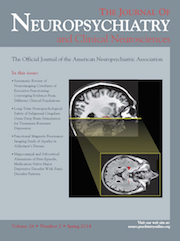To the Editor: How do affective characteristics influence theory of mind (ToM), (i.e., the ability to ascribe mental states to others)? Major depression may impair the inference of others’ feelings
1 (i.e., affective ToM), but in nonclinical subjects, mild levels of depression and anxiety may counterintuitively enhance this ability.
2 We investigated this relationship by enrolling subjects from outpatients referred to our clinic for subjective memory complaints; inclusion criteria were age between 40 and 80 years, preserved cognitive functioning at the neuropsychological assessment, negative neurological and psychiatric history, any severe concomitant depressive and/or anxious symptomatology, any concomitant antidepressant use, or anxiolytic pharmacological treatment. Considering that only a few men were represented in our sample and that women have higher prevalence of affective disorders and better emotion processing abilities,
3 we excluded men from the final sample of 40 women.
Affective ToM was assessed with the reading the mind in the eyes (RME),
4 a task consisting of the presentation of photographs of the eye region of human faces; participants are required to choose which word best describes what the individual in the photograph is feeling); subjects also completed the Beck Depression Inventory (BDI) and the Hamilton Anxiety Rating Scale (HAM-A) and were categorized as mildly depressed (BDI score >12) and not depressed (BDI score ≤12), and as moderately anxious (HAM-A score >17) and mildly anxious (HAM-A score ≤17).
The neuropsychiatric assessment produced these findings: mean age 65.80±9.40 years; mean education 9.50±4.0 years; mean BDI score 5.66±5.22 (10 mildly depressed subjects, 30 not depressed); mean HAM-A score 9.32±7.80 (29 subjects with mild anxiety, 11 with moderate anxiety); mean RME score was 21.33±4.47. A stepwise regression analysis with RME performance as a dependent variable and demographic features (age and education) and affective features (BDI score and HAM-A score) as independent variables was performed. Two models were generated: in the first model, the RME performance was associated with depression and education (F=4.730; p ≤0.01), and in the second model, the RME performance was associated only with depression (F=5.294; p <0.05). Although mildly depressed subjects and not depressed subjects had similar age, education, and anxiety level, t test comparison showed that mildly depressed subjects outperformed not depressed subjects in the RME (24.22±5.04 versus 20.48±3.99; t=–2.328; p <0.05); BDI score and RME performance positively correlated (r=0.333; p <0.05).
We found that mild depression may enhance affective ToM, as previously reported in a nonclinical sample of college students,
2 indicating that depression severity may differentially affect social processing: mildly depressed subjects could be hypervigilant in their social information processing to gain control over their social environment; conversely, clinically depressed individuals may characterize their social relationships as hopeless and may stop paying attention to social information.
5 This could support the hypothesis of a curvilinear relation between depressed mood and affective ToM, such that mildly depressed subjects show superior performance relative to not depressed subjects, whereas performance decreases as the severity of depression increases toward clinical levels.
1 This finding needs further empirical confirmation in larger samples of subjects.

